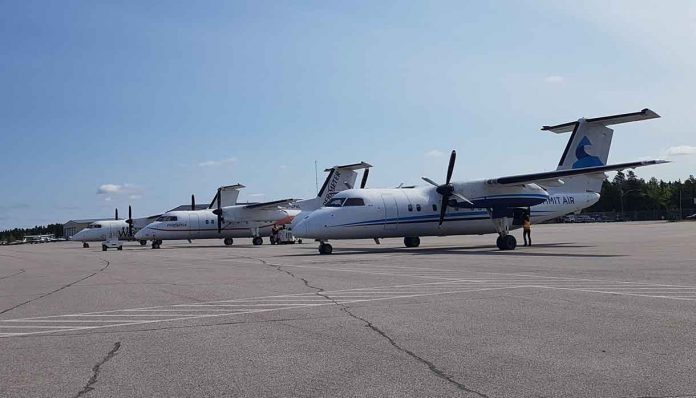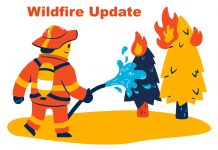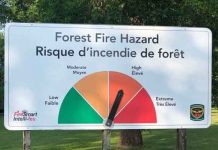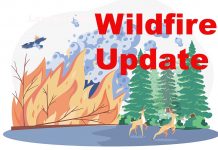
Pikangikum Wild Fire Update – Evacuations Continue
THUNDER BAY – The forest fire situation is moderating for several areas of Northwestern Ontario. This is due to a weather system bringing cooler temperatures and some precipitation.
The forest fire most impacting Pikangikum is Red Lake #14. The Royal Canadian Airport reports that today (June 3), the RCAF had two CC130J Hercules aircraft from 8 Wing Trenton, Ont. (operating out of 17 Wing Winnipeg) on standby to support evacuations if required by the Province of Ontario. So far, we have not been asked by the province to provide any airlift support today.
The Royal Canadian Air Force also has two CH147F Chinook helicopters on standby in Red Lake, Ont.
Should the Royal Canadian Air Force be called on today to support evacuations, the exact number of evacuees and where they will be hosted will not be confirmed until after the airlifts are complete (due to the fluid nature of the situation) but will be directed to us by the Province.
The Province of Ontario remains the overall lead on evacuations from Pikangikum First Nation, and has civil aircraft assisting with evacuations. Until today, Royal Canadian Air Force CC-130 Hercules from 8 Wing Trenton, Ont., and 17 Wing Winnipeg, Man. were the primary airlift assets evacuating 1,791 people out of Pikangikum First Nation to host communities.
Today North Star Air had to flights going to Pikangikum this afternoon to transport evacuees to Winnipeg.
To date, so far approximately 2,000 people have been evacuated from Pikangikum and evacuations efforts are still in progress. As of today, 330 evacuees have been transported to Winnipeg. There are two hundred evacuees in Thunder Bay.
Due to smoke, elevated pollution levels coupled with high levels of air pollution are expected around Pikangikum in the area. Smoke plumes have resulted in deteriorated air quality around the community. Winds are expected to shift from the south and southeast today, which may cause smoke to return into the area.
Forest Fire Situation Update – Northwest Region
June 3, 2019 – Time of Report 17:54
There were no new fires in the Northwest Region by the early evening of June 3.
At the time of this update there were three active fires in the region, one of which is not under control.
Red Lake 14 near Pikangikum
Red Lake 14 near the community of Pikangikum is now sized at 3835.1 hectares and is not yet under control. A total of 16 four-person FireRanger crews and two local Type-2 sustained attack crews are now assigned to the fire. An Incident Management Team will assume command of the fire suppression effort early this week. Crews continue working the west and north flanks of the fire nearest the community as well as focus on values protection, setting up sprinklers on homes, buildings and infrastructure as a precautionary measure.
Fire hazard in the Northwest Region
A weather system moving into the northwest is tempering the fire hazard in parts of the region today. A high hazard remains in place for the Red Lake and parts of the Sioux Lookout, Dryden and Thunder Bay sectors, while Fort Frances and Kenora sectors are beginning to show moderate fire hazard conditions. Nipigon sector features mostly low to moderate fire hazard conditions.
AFFES staff deployed out of province
Approximately 230 staff members from Aviation, Forest Fire and Emergency Services are assisting the province of Alberta with its escalated fire situation. This includes FireRangers, support staff and one incident management team. In addition, the Ministry of Natural Resources and Forestry is providing equipment such as pumps, hose and hand tools to support Alberta.
More than 50 staff members from Aviation, Forest Fire and Emergency Services have been deployed to assist the Yukon with current active forest fires. This includes FireRangers and support staff.
There are also an additional 2 support staff members from Ontario who have been deployed out of province, one to assist the Canadian Interagency Forest Fire Centre in Winnipeg, and one to the Northwest Territories.
The sharing of resources across Canada is facilitated by the Canadian Interagency Forest Fire Centre in Winnipeg under the Mutual Aid Resource Sharing agreement.
The fire situation in Ontario has been relatively quiet since the beginning of the 2019 fire season, and we remain fully prepared to respond to any forest fires that may arise here at home.
Help prevent forest fires
Adopt safe campfire practices! Choose the site of your campfire carefully and keep your fire small. Stay nearby: never leave it unattended. Put your fire out by drowning it with water. Be sure that it is extinguished prior to leaving the site. Stir the ashes with a stick to uncover hot coals and then drown it again. You can never be too safe.
Consider alternatives to burning brush or yard waste, such as chipping or composting when possible, or saving burn piles for the fall or after the fire season. Use of outdoor fires must follow the outdoor burning rules set out in the Forest Fire Prevention Act of Ontario. Fires are to be started no sooner than two hours before sunset and extinguished no later than two hours after sunrise. Fires should never be left unattended and tools and water should be close at hand to put the fire out. More details on outdoor burning regulations can be found online at Ontario.ca/forestfire
To see a complete list of fires across the province click on our interactive map. You can also get the latest update on the condition of any fire by clicking the fire icon.
Fire numbers and online information:
- Forest Fire Reporting Number – 310-FIRE (3473)
- Twitter account




